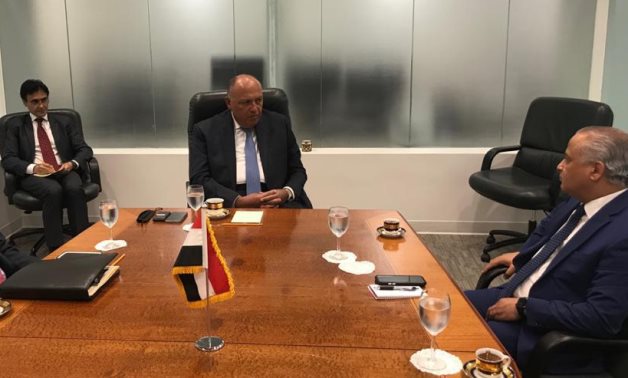
Egyptian Foreign Minister Sameh Shoukry met on Monday with Ambassador Tarek Adab, Tunisian permanent representative to the United Nations - press photo
CAIRO – 5 July 2021: Egyptian Foreign Minister Sameh Shoukry met on Monday with Ambassador Tarek Adab, Tunisian permanent representative to the United Nations in New York, where he will participate in a scheduled session of the UN Security Council on the Grand Ethiopian Renaissance Dam (GERD) issue.
At the meeting, Minister Shoukry stressed Egypt's keenness to closely coordinate with Tunisia in the GERD file in light of the excellent bilateral relations that “unite the two countries, and taking into account that Tunisia is the current Arab member of the Security Council,” said Egyptian Foreign Ministry’s official spokesperson Ahmed Hafez in a statement.
Shoukry praised the great support provided by Tunisia to the Egyptian position in this file, Hafez added.
Shoury headed on Sunday for New York within the framework of preparations for an urgent meeting of the United Nations Security Council (UNSC) on GRED.
The UNSC meeting comes at a request from Egypt and Sudan.
Foreign Ministry spokesman Ahmed Hafez said Shoukry will hold a series of intensive meetings with his counterparts, UN officials and permanent delegates to the UNSC.
Egypt seeks to reach a binding legal agreement on filling and operating the dam that takes into consideration the interests of Egypt, Sudan and Ethiopia.
Shoukry said Egypt has been engaged in negotiations for 10 years to settle the crisis of the Grand Ethiopian Renaissance Dam but in vain due to Ethiopia’s intransigence.
Speaking to DMC TV channel on Saturday, the minister said Egypt is set to submit a review of the current situation of this issue to the UN Security Council session on Thursday.
He highlighted Ethiopia’s repeated statements on the second filing of the dam, noting that such steps contradict the Nile River-linked treaties.
The minister pointed out that such moves taken by Ethiopia pose threats to international peace and security, so the Security Council should assume its responsibility to contain any possible escalation on this score.
Shoukry added that the African Union sought to solve this issue but in vain due to Ethiopia’s stubbornness.
In mid-July 2020, Ethiopian authorities unilaterally carried out the first phase of the filling process with 4.9 billion cubic meters; and it is expected that the second phase of the filling would reach 13 billion cubic meters.
The dispute among Egypt, Sudan, and Ethiopia dates back to May 2011 when Ethiopia started building the dam; Egypt voiced concern over its water share [55.5 billion cubic meters].
In 2015, the three countries signed the Declaration of Principles, per which the downstream countries should not be negatively affected by the construction of the dam, whose capacity is 74 billion cubic meters and is planned to generate 6,000 megawatts per annum through 16 turbines.

Comments
Leave a Comment